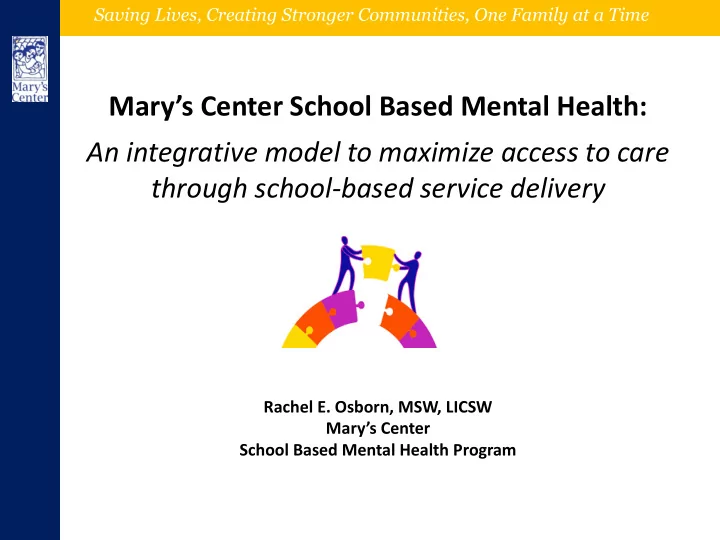

Saving Lives, Creating Stronger Communities, One Family at a Time Mary’s Center School Based Mental Health: An integrative model to maximize access to care through school-based service delivery Rachel E. Osborn, MSW, LICSW Mary’s Center School Based Mental Health Program
Saving Lives, Creating Stronger Communities, One Family at a Time Mary’s Center Our Mission: Building better futures through the delivery of health care, education, and social services by embracing our culturally diverse community and providing the highest quality care, regardless of ability to pay. Became a Federally Qualified Health Center in 2005 Provide Culturally and Linguistically Appropriate Services Serve nearly 40,000 socially and medically vulnerable individuals Historic focus on serving low-income immigrant families
Saving Lives, Creating Stronger Communities, One Family at a Time Mary’s Center’s Social Change Model Saves Lives Stabilizes Families Creates Stronger Communities
Saving Lives, Creating Stronger Communities, One Family at a Time Overview of Programs HEALTH • Prenatal SOCIAL SERVICES • Pediatrics/Adolescents • Case Management • Adult Medicine • Behavioral Health • Psychiatric • School Based Mental Health • Dental • Senior Health and Wellness • Health Promotion • Early Intervention for Children with • Chronic diseases Special Needs • Home Visiting • Benefits Enrollment Assistance EDUCATION • WIC Program • Early Childhood Education • English and Computer Classes for Adults • Parenting Classes • High School Diploma • Child Care Credential Training • Medical Assistant Training • Child Care Licensing Technical Assistance • Coaching Hub for Infant and Toddler Child Care Providers • Adolescent Tutoring and College Preparation
Saving Lives, Creating Stronger Communities, One Family at a Time School Based Mental Health (SBMH) Program Created to decrease access barriers for youth and families to MH care • Reduce access barriers by staffing MH providers on-site in school settings • Provide full episode of care with added opportunities for care coordination • Partner schools are proximate to clinics for easy linkage to additional services • Supplement and bolster – not replace – existing school mental health services • Partner schools are majority Medicaid-insured students • Program operates and self-sustains through Tier 3 Medicaid billing • SY 2016-17: served 856 clients through 9,488 encounters in 15 schools •
Saving Lives, Creating Stronger Communities, One Family at a Time Example of tiered services Tier 1 (non-billable) -School health and advisory lessons on socioemotional wellness -Workshops for parents on positive discipline and stress management -Trainings for teachers on trauma-informed education -Care coordination and advocacy in school & community for high-intensity clients Tier 2 (mostly non-billable): -Interdisciplinary team meetings to discuss supports for at-risk students -Targeted parent workshops on cyber bullying, gang prevention, family reunification -Short-term, brief counseling episodes of care for at-risk students Tier 3 (all-billable): -Individual therapy (ex: Trauma-focused Cognitive Behavioral Therapy) -Group therapy (ex: mindfulness, anger management, anxiety, newcomer support) -Family therapy (ex: Parent-Child Interaction Therapy, Attachment-based Family Therapy) -Community Support services – with grant support Goal: maximize T3 billing to allow for T1 and T2 impact in collaboration with school partners
Saving Lives, Creating Stronger Communities, One Family at a Time SBMH Program Operationalized Partner with schools to circulate information on applying for Medicaid • Each partner school becomes part of our Scope of Services as an FQHC • MOU process includes discussion of insurance billing with schools • Intake process includes discussion of insurance billing with families • Therapists connect families to other services within agency & community • Resource mapping at each school outlines each provider’s scope and limitations • FQHC reimbursement rate means a steady, stable funding stream • T3 billing allows us to broaden services and provide limited T1 and T2 support • Therapists focus on providing “episodes of care” to allow for caseload fluidity •
Saving Lives, Creating Stronger Communities, One Family at a Time Considerations for schools looking to form community partnerships What gaps exist in services we currently provide? • Who is our student body? Where do they live and get care? • Who are potential partners? Which know our population and • have experience doing billable school-based work? What is our state/district/school mental health plan and • where do community partners fit in? Do we have space to dedicate to outside providers? • How can we fund and provide non-billable prevention work? • What challenges exist and how can we swim upstream? •
Saving Lives, Creating Stronger Communities, One Family at a Time For additional information: Mary’s Center’s SBMH Program: www.maryscenter.org/sbmh Marisa Parrella, LICSW, LCSW-C SBMH Senior Clinical Manager mparrella@maryscenter.org Rachel Osborn, LICSW SBMH Clinical Manager rosborn@maryscenter.org
Recommend
More recommend